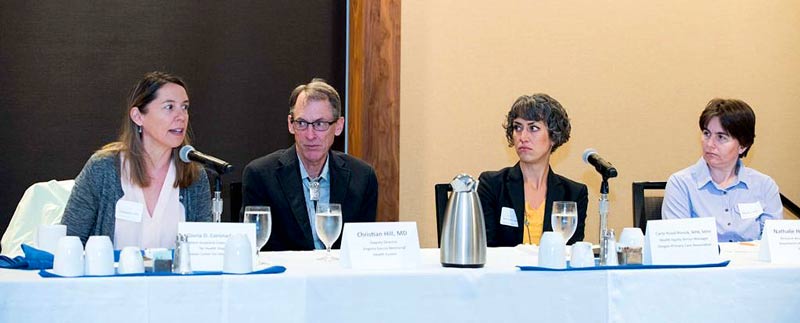Addressing racial disparities in health care
Stories - June 24 2019

CHR Investigator Gloria Coronado joined Oregon Health Forum discussion on how to remove barriers and address issues of health equity for the populations we serve

Health care disparities persist in our community despite efforts to reduce them. Certain populations, whether because of race or ethnicity, gender or gender identity, age, sexual orientation, disability or socioeconomic status, are at higher risk of having limited access to care or experiencing poorer quality of care, ultimately leading to worse health outcomes.
At a recent Oregon Health Forum breakfast event on Wednesday, June 19, 2019, Gloria Coronado, PhD, Distinguished Investigator and the Mitch Greenlick Endowed Scientist for Health Disparities at Kaiser Permanente’s Center for Health Research (CHR), participated in the panel discussion “When the Health Care System Fails You Because of Your Race.” Sponsored by Kaiser Permanente Northwest (KPNW), the panel also featured administrators, researchers and clinicians from Multnomah County, Oregon Health & Sciences University, Virginia Garcia Memorial Health Center and the Oregon Primary Care Association.
 Gloria Coronado, PhD
Gloria Coronado, PhD
Disparities affect more than just the individual
According to Coronado, disparities affect us all. “While health and health care disparities are viewed through the lens of race and ethnicity, they occur across a broad range of dimensions and reflect a complex set of individual, social and environmental factors,” she noted. “Disparities not only affect the groups facing disparities, but they also limit continuous improvements in overall quality of care and health for the broader population and, in the end, result in unnecessary health care costs.”
A study by the W.K. Kellogg Foundation found that the estimated cost of such health disparities in the United States is $93 billion, primarily due to treatments for chronic diseases that could have been prevented.
The changing face of the U.S. population
Coronado, the daughter of an immigrant family, conducts research on health disparities related to cancer prevention among underserved populations. She pointed out to the audience that addressing disparities is becoming increasingly important as the United States population grows more diverse. According to projections from the U.S. Census Bureau, the United States will be majority non-white by 2045, with the largest growth occurring among Latinos. Language barriers, housing issues and income disparities are all factors which prevent access to preventive care.
“Latinos face many barriers to using preventive services, including lower levels of education, limited access to health care, lack of health insurance and no consistent primary care provider,” she noted. Measuring racial disparities is the first step to addressing them. Community engagement and cultural competency are critical, as is leveraging health information technology to promote scalable, sustainable and effective practice-based interventions. One research project she is leading at a community health clinic in Seattle is studying whether risk prediction can help identify patients who would benefit from patient navigation to get the colonoscopies they need.
She also warned the audience to be mindful that new innovations in quality improvement and technology must not result in worsening health disparities. “We need to ensure that quality improvements and innovations in care, don’t leave people behind through lack of access to those innovations. Not all patients have access to email and electronic portals that offer health systems an efficient way to communicate.”
The importance of collaboration and partnership
Finally, she spoke of the need to expand public-private partnerships and shared with the OHF audience an example of a 2015 initiative that focused on improving rates of breast cancer screening among unscreened Latinas. A partnership between Susan G. Komen Oregon and Kaiser Permanente Northwest led to the donation of hundreds of mammograms and follow-up care for Portland-area Latinas, many of whom were screened for the first time. In addition, KPNW used their involvement in the initiative as an opportunity to improve the quality of its services to all Latino patients, including through multilingual signage and call center support.
The forum closed with appeals from audience members to focus on communities at greatest risk, address the root causes of health care disparities and increase the support for people of color within the health care workforce.
About the Oregon Health Forum
The Oregon Health Forum is the educational arm of The Lund Report and provides a place where healthcare leaders can discuss pivotal issues and interact with their colleagues. The public is welcome to attend these breakfast forums held at the Multnomah Athletic Club. Topics explored at past forums have included the future of CCOs in Oregon, health care payment reform, pharmaceutical costs and the future of Oregon’s health care workforce. For more information or to see upcoming health care forums, visit http://www.oregonhealthforum.org/.